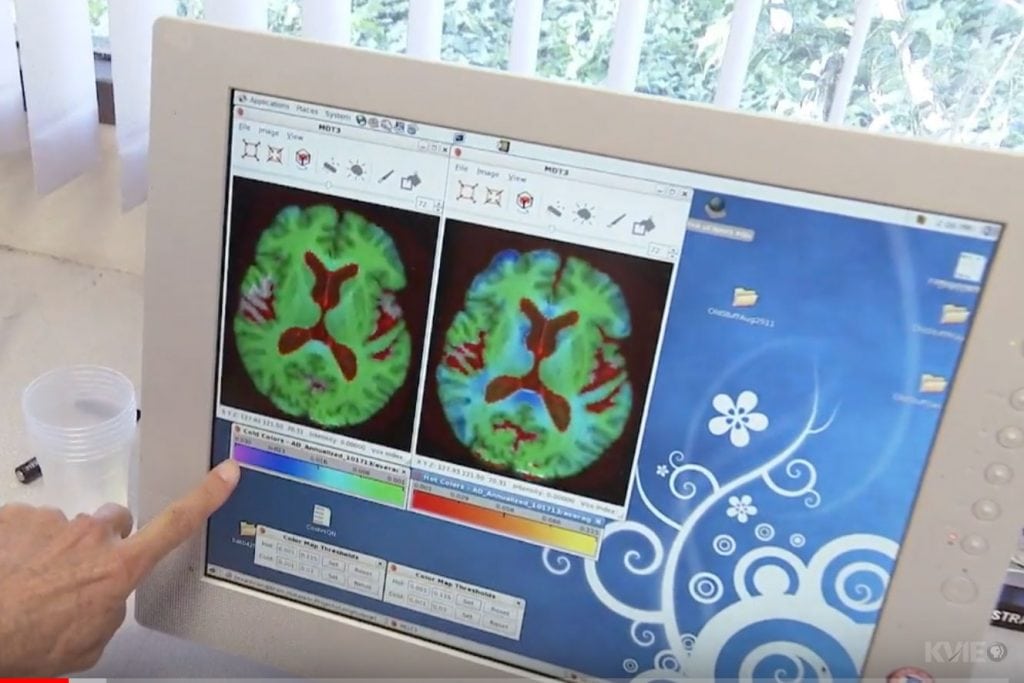Alzheimer’s disease usually affects people over the age of 65. By the age of 80, one in six people have acquired the condition.
As they struggle to meet the needs of aging relatives who suffer from dementia, caregivers naturally worry about their own risk of acquiring Alzheimer’s or some other disease that erodes memory. It’s natural to become forgetful as we age — jokes about “senior moments” reflect that shared experience — but memory lapses often cause caregivers to wonder whether they have inherited the same trait that caused a parent’s dementia.
The causes of dementia are not well understood. Scientists do know that there is a genetic component to Alzheimer’s. One variant of a particular gene is associated with an increased risk for developing Alzheimer’s. Another variant, albeit one that is rare, may provide some protection against Alzheimer’s. The most common variant of the gene apparently has no association with the disease.
Genes are inherited from both parents. A child will not necessarily inherit a parent’s genetic predisposition to Alzheimer’s. A child who inherits the variant associated with an increased risk of Alzheimer’s will not inevitably suffer from dementia. Some people who inherit the gene variant that elevates risk never acquire Alzheimer’s. Some people who have Alzheimer’s do not have the risk-elevating gene variant.
Mutations in a different set of genes may be responsible for early-onset Alzheimer’s, a less common form of the disease that typically occurs between the ages of 30 and 65. A child who inherits one of the mutated genes associated with early-onset Alzheimer’s has about a 50% chance of developing the disease.
Early Signs of Dementia
Between early-onset Alzheimer’s and the more common development of Alzheimer’s much later in life lies a “gray zone” known as mild cognitive impairment (“MCI”). Symptoms include “forgetting people’s names, forgetting perhaps that you’ve said something already, forgetting a story, forgetting words.” Individuals with MCI “might have trouble remembering conversations, keeping track of things, maintaining their train of thought during a conversation, navigating a usually familiar place or completing everyday tasks, such as paying a bill.”
The symptoms of MCI are noticeable, but they do not always interfere with daily life. Individuals with MCI do not inevitably experience a further decline and some recover from the condition. Still, about a third of patients who are diagnosed with mild cognitive impairment will be diagnosed with Alzheimer’s within five years.
People tend to dismiss the symptoms of MCI as a common product of aging. A mild degree of cognitive decline accompanies changes in brain structures as people age. Those changes are generally experienced as slower thinking and “difficulties sustaining attention, multitasking, holding information in mind and word-finding.” However, normal changes in cognition that accompany aging differ from MCI.
While the condition does correlate with age, MCI — unlike aging — is a disease. A new report suggests that MCI affects 12% to 18% of people who are over the age of 65. Yet the condition is difficult to recognize. Other factors that may cause forgetfulness include fatigue, depression, or medication side effects. While no diagnostic tool can clearly identify MCI, specialists can base a diagnosis on the patient’s history and performance on a variety of tests.
Prevention and Treatment of Mild Cognitive Impairment
Recognizing the warning signs of MCI and dementia might lead to an early diagnosis and the possibility of effective treatment. In addition to the symptoms discussed above, recent evidence suggests that excessive napping is associated with dementia. Napping probably doesn’t cause dementia. It is more likely that changes in brain chemistry associated with dementia promote the desire to take a nap.
An early diagnosis of MCI may open the door to treatment options. Unfortunately, trials of Alzheimer’s drugs have not shown a clear benefit to patients with MCI. Since the disease is more likely to progress in patients with a heart condition, diabetes, or a history of strokes, taking medication to reduce blood pressure, prevent blood clots, or lower cholesterol might control the progress of the disease. Treating depression might also have a positive impact on MCI.
Lifestyle changes might reduce the risk of acquiring MCI. Regular exercise, a healthy diet, mental activity, and socializing with friends can all prevent underlying health conditions that may contribute to MCI and dementia. Avoiding stress and ridding a life of needless drama can improve attitude and may help aging people avoid brain-changing conditions that contribute to dementia.
